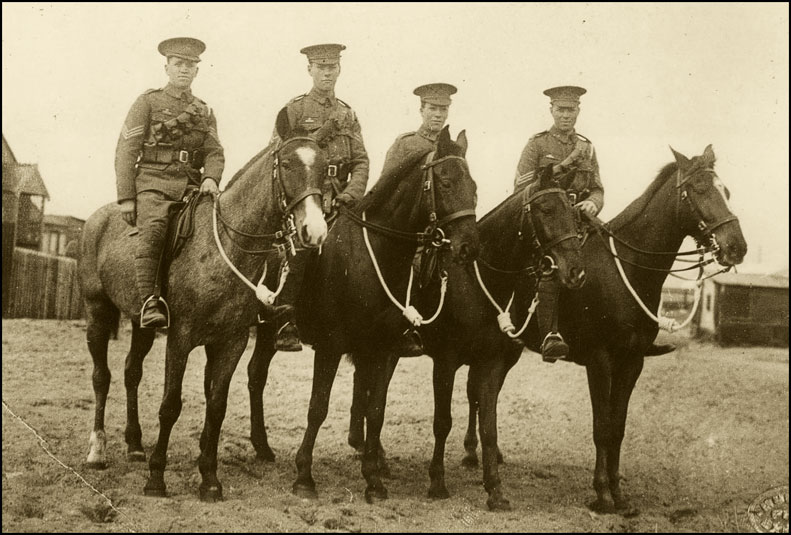Lieutenant Richard Berry Kellock
Richard Berry Kellock was born in Ashburton, Canterbury, New Zealand, on 9 July 1897, son of farmer William Plumer Kellock and his wife Martha Clarissa (nee Grigg).
His father had originally come from Devon, and in the 1900s returned there with his family, living at Allerton farm, Totnes. Richard was educated at Blundell's School, Tiverton.
On 5 October 1914 Richard enlisted in the 2/1 Royal North Devon Hussars at Barnstaple (No.1196). He was aged just 17, but stated on the enlistment form that he was 18 years 9 months. Joining the regiment at the same time were Richard's older brother Harold Plumer Kellock, aged 18, and their cousins from New Zealand, twin brothers John and Gilbert Grigg.
Richard was promoted to lance-corporal on 31 October 1914, corporal on 24 July 1915, lance-sergeant on 21 August 1915 and sergeant on 2 October 1915. Harold meanwhile rose to the rank of corporal.
In July 1915 the Grigg brothers transferred to the Inns of Court Officer Training Corps and were commissioned as 2nd lieutenants in the North Irish Horse the following month. They went to France with E Squadron in January 1916.
Richard and Harold applied for commissions on 8 December 1915, supported by Lieutenant-Colonel Maude of the North Irish Horse, who wrote to their commanding officer:
R.B. Kellock and H.B. Kellock [sic] have applied to me for Commissions in this Regiment, if you will recommend them I shall be very glad to take them.
Both men were commissioned as 2nd lieutenants in the North Irish Horse on 9 January 1916 and were posted to the regiment's reserve depot at Antrim. Within weeks, however, Richard was sent to France where he rejoined his cousins the Griggs in E Squadron. The war diary of the squadron makes reference to Richard Kellock on 31 March 1916:
2 Lt. R B Kellock & 1 man left for La Boudrelle school of instruction.
Harold embarked for France on 2 June 1916, also joining E Squadron.
On 9 July 1917 the Kellock brothers were promoted to the rank of lieutenant.
In March 1918 the 1st North Irish Horse was dismounted and converted to a corps cyclist regiment, a change which necessitated a reduction in the number of officers and men required. The Kellocks and Griggs all sought transfers to the Royal Field Artillery. In June Richard was posted to the 17th Division – C Battery, LXXVII Brigade – on six weeks probation. (Harold had joined the 29th Division – XVII Brigade.)
On 29 August 1918 he was wounded at Flers by a piece of shell in the right forearm. He was evacuated to No.8 General Hospital at Rouen and on 2 September shipped to England, where he was sent to a hospital for officers in Exeter.
The wound was not severe and on 30 September a medical board found him fit for duty, ordering that he report to the North Irish Horse reserve at Antrim after three weeks leave. A further medical board, at Belfast on 2 January 1919, found that he had fully recovered. He was demobilised on 29 January 1919 and resigned his commission on 12 February the following year.
His brother Harold had not been so lucky. On 28 September 1918 he had been wounded by shellfire and died eight days later. Another brother, William Thomas Grigg Kellock, had also served during the war, in South Africa and in Egypt as an officer of the Royal North Devon Yeomanry. He too was wounded, a newspaper account from October 1918 stating that he was in hospital in Wandsworth.
After the war Richard Kellock returned to New Zealand. He died on 10 September 1969 and is buried in the cemetery at Waikari, Canterbury.

Richard Berry Kellock (second from left) with his brother Harold Plumer Kellock (third from left) and their cousins Gilbert Hutton Grigg (left) and John Hutton Grigg (right), while serving in the Royal North Devon Hussars
Image and much helpful family background kindly provided by Penny Otto and Jill McLaren.
